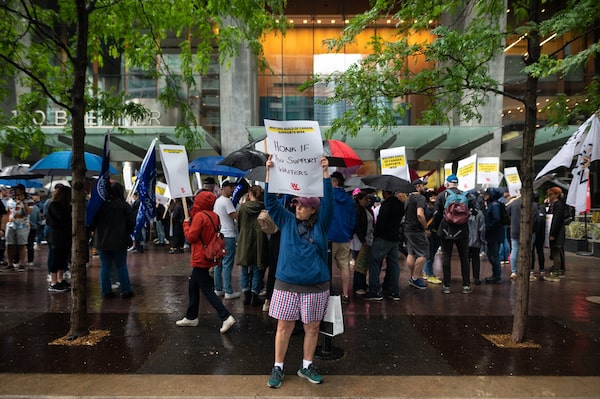
Members of the Writers Guild of Canada gather outside the office building for both Amazon and Apple for a rally in support of U.S. screenwriters in downtown Toronto, on June 14, 2023.Tijana Martin/The Canadian Press
The Writers Guild of Canada has voted to authorize a strike after six months of negotiations with the Canadian Media Producers Association, as its English-language screenwriters push for greater pay and staffing minimums, as well as protections against generative artificial intelligence models.
The 2,500-member union announced Thursday that 96.5 per cent of its voting members were in favour of authorizing a strike for the first time in its 33-year history. The Writers Guild cautioned it would not immediately strike – instead, its leaders will use the vote result as a bargaining tool in negotiations.
Guild president Alex Levine said in an interview that the writers’ top priorities are boosted compensation from producers, particularly for animation writers’ up-front script fees; increased minimum staffing on shows, especially once they are in production; and protections for their creative work against AI.
“Our hope is that this show of unity will encourage them to start to move on some of these core issues,” said Levine, a co-executive producer on Orphan Black who’s done writing and script work for numerous Stargate series.
The screen sector is facing a critical moment as generative AI tools evolve. The Writers Guild’s American counterparts spent much of 2023 striking for similar benefits and protections alongside U.S. actors, raising concerns that AI-generated creative output such as script drafts could devalue their work and demean creativity.
Levine said the screenwriters were not seeking a blanket ban on AI from producers, but rather clearer protections throughout the writing process, including at the story-development and conception phase – plus clear disclosures when AI models are being used.
“We do not want to strike,” he said. “Our goal is to reach a fair agreement and keep the industry working and protect the livelihoods of Canadian screenwriters.”
In an e-mail, Sean Porter, the Canadian Media Producers Association’s vice-president of industry relations, said, “Canadian producers value the work of Canadian screenwriters and sincerely believe that future Canadian projects should be written by humans, not AI algorithms. We believe a labour dispute would be extremely damaging to the domestic Canadian film and television production sector and we remain focused on successfully concluding negotiations.”
Screenwriters in Canada face additional headwinds as they strive to tell this country’s stories in a U.S.-dominated sector. In a filing with the Canadian Radio-television and Telecommunications Commission last year amid national broadcast reforms, the Writers Guild warned that the country needed to find ways to protect and fairly finance Canadian storytelling – particularly in an era when the Canadian broadcaster licence fees that fund domestic programming face a “stark decline.”
In the past five years, the guild warned, its members saw their aggregate earnings decline by about 22 per cent when adjusted for inflation.
The screenwriters are worried about needing to do more with fewer resources – in terms of pay, but also other resources, such as having fewer days to write or fewer writers attached to a project. These matters can be compounded for screenwriters who have long faced structural barriers in the industry.
“These kinds of negotiations are so critical, not just for the growth and wellness and continuity of the industry from a creative perspective, but for Indigenous people,” says Jennifer Podemski, the Canadian screen veteran and Little Bird showrunner, who is from the Muscowpetung Saulteaux Nation in Saskatchewan. “From an Indigenous perspective, our opportunities are so limited already, and our voice and perspectives have been so marginalized if not erased over time.”
Nathalie Younglai, a children’s TV writer, Coroner co-executive producer and the founder of the screen-industry advocacy group BIPOC TV & Film, said the guild’s sticking points are crucial to training the next generation of writers and showrunners. The structure of animated-show writing, she said, requires significant unpaid work to bring ideas forward that might not even be greenlit.
“It feels really unethical to be putting new writers into the animation space when scripts are getting shorter, which means even less money for you to have a career, or even sustenance,” Younglai said. In live productions, greater minimum staffing would help broaden the chances for young writers, particularly those from diverse backgrounds, to lead the next generation of storytelling: “If you don’t have those opportunities, we’ll be left with a bunch of shows that people aren’t equipped to run.”
 Josh O’Kane
Josh O’Kane